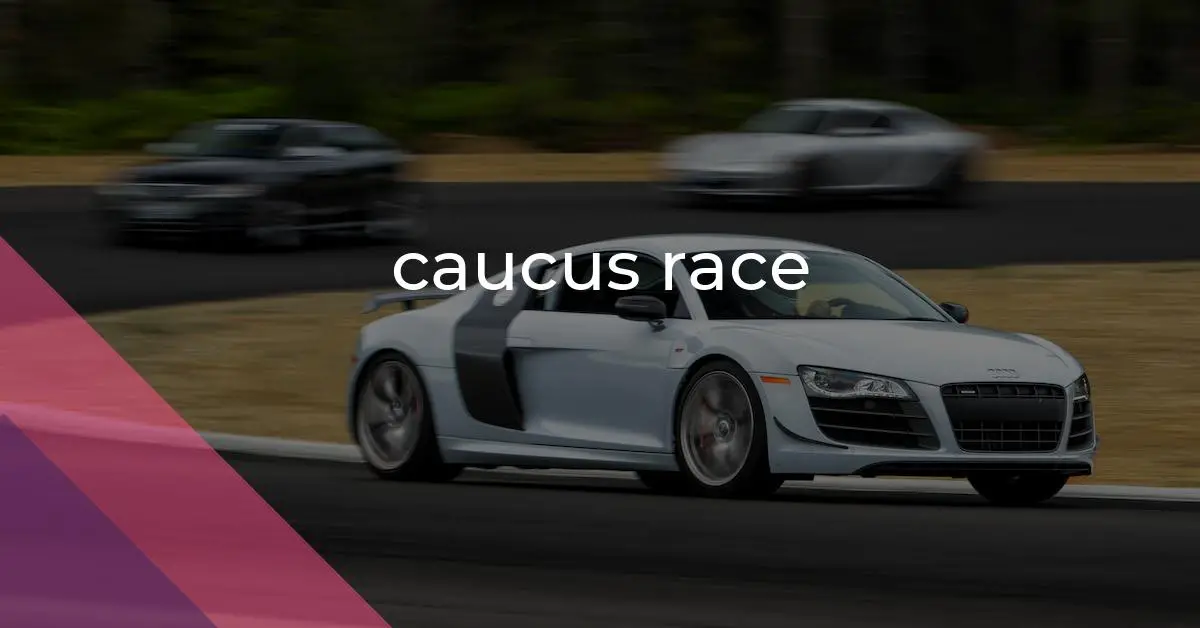caucus race: Idiom Meaning and Origin
What does ‘caucus race’ mean?
The idiom "caucus race" refers to a competitive situation where everyone participates but no clear winner emerges, reminiscent of the Dodo's Caucus Race in Lewis Carroll's "Alice in Wonderland".

Idiom Explorer
The idiomatic expression "one-horse race" refers to a competition or contest in which the outcome is completely predetermined, usually due to the overwhelming superiority of one participant.
The idiom "law of the jungle" refers to a situation where people act in a selfish, ruthless, and survival-oriented manner, with no regard for moral or ethical principles. It implies a chaotic and competitive environment where only the strongest and most cunning individuals succeed.
The idiom "in the running" means to be a competitor or have a chance of winning in a particular competition or pursuit.
The idiom "in the lead" means to be in a leading or winning position, often in a competition or race.
The idiom "in the game" means actively participating or being involved in a particular activity or situation.
The idiom "in chorus" means to do or say something together, simultaneously, or in unison as a group. It implies a shared agreement or unified response among individuals.
An idiom meaning a controversial issue or situation that is difficult to handle, and often passed quickly from person to person to avoid dealing with it.
The idiom "horses for courses" means that different people or things are suited to different tasks or situations.
The idiom "horse and rabbit stew" is not a commonly known expression. It does not have a widely accepted meaning or usage. No reliable sources support its existence as an idiom.
The idiom "hold with the hare and run with the hounds" means to support or be loyal to two opposing factions, causes, or groups. It suggests being deceitful or indecisive by trying to please both sides.
Curious Conclusion
A caucus race is an idiomatic expression that originates from Lewis Carroll's Alice’s Adventures in Wonderland. It is used to describe a situation or contest where participants are engaged in an aimless or chaotic struggle without any clear rules or purpose.
This idiom is derived from a specific scene in the book where Alice, the main character, participates in a race with other creatures including a dodo bird, a mouse, and various other animals. In this race, there is no designated finish line or any defined method of determining the winner. Instead, all the participants run in different directions and continue until they are tired. At that point, the dodo bird suggests that everyone is a winner and the race should end. Hence, the term "caucus race" came to represent a situation where everyone is a participant, but there is no clear indication of what constitutes success or how it can be achieved.
Metaphorically, the phrase "caucus race" has been used to describe various situations or activities that lack a clear objective or purpose. It often highlights the sense of futility and confusion in endeavors where progress is uncertain or difficult to measure. This idiom may typically be employed when discussing chaotic political processes, disorganized competitions, or even mundane daily routines that seem to lead nowhere.
One related idiom that shares similarities with the concept of a caucus race is "one-horse race." This phrase is used to describe a competition or contest where only one participant has a realistic chance of winning. In such a scenario, the outcome is almost predetermined, resembling a race with only a single horse. While a caucus race emphasizes chaos and lack of direction, a one-horse race emphasizes a lack of competitiveness and suspense.
It is worth noting that the idiom "caucus race" is not commonly used in everyday conversation. It is primarily known and referenced in the context of Lewis Carroll's work. However, it has been sporadically employed in literary or journalistic pieces to convey a particular sense of aimlessness or disorder.
The exact origin and development of the idiom beyond its connection to "Alice’s Adventures in Wonderland" is unclear. It is likely that the phrase gained popularity due to the enduring fame of Carroll's novel and the memorable nature of the caucus race scene in which the idiom appears.
Another related idiom that captures the essence of a caucus race is "cat-and-mouse." This term is often used to describe a situation or relationship characterized by a constant pursuit and evasion between two parties. The phrase originates from the predatory nature of cats and the elusive nature of mice. In a caucus race, the participants are engaged in a struggle without any clear rules or purpose, much like the unpredictable and evasive nature of a cat-and-mouse chase.
The idiom "caucus race" refers to a situation or contest characterized by aimlessness, chaos, and a lack of clear rules or purpose. It finds its origins in Lewis Carroll's work, specifically the scene in "Alice’s Adventures in Wonderland" where participants in a race run without a clear finish line or criteria for success. Although not commonly used in everyday conversation, the idiom has been sporadically employed in literature and journalism to illustrate the futility and confusion in various scenarios. Its connection to Carroll's book remains its primary source of recognition among readers and scholars alike. While the idiom's exact origins beyond Carroll's work are uncertain, its usage continues to highlight the ambiguous nature of certain endeavors and the absence of clearly defined goals or outcomes.
Example usage
Examples of how the idiom caucus race can be used in a sentence:
- The students in the debate club organized a caucus race to determine their next president.
- After the meeting, the executives held a caucus race to decide on the new company logo.
- In order to choose the winner of the talent show, the judges decided to have a caucus race among the finalists.
More "Competition" idioms



